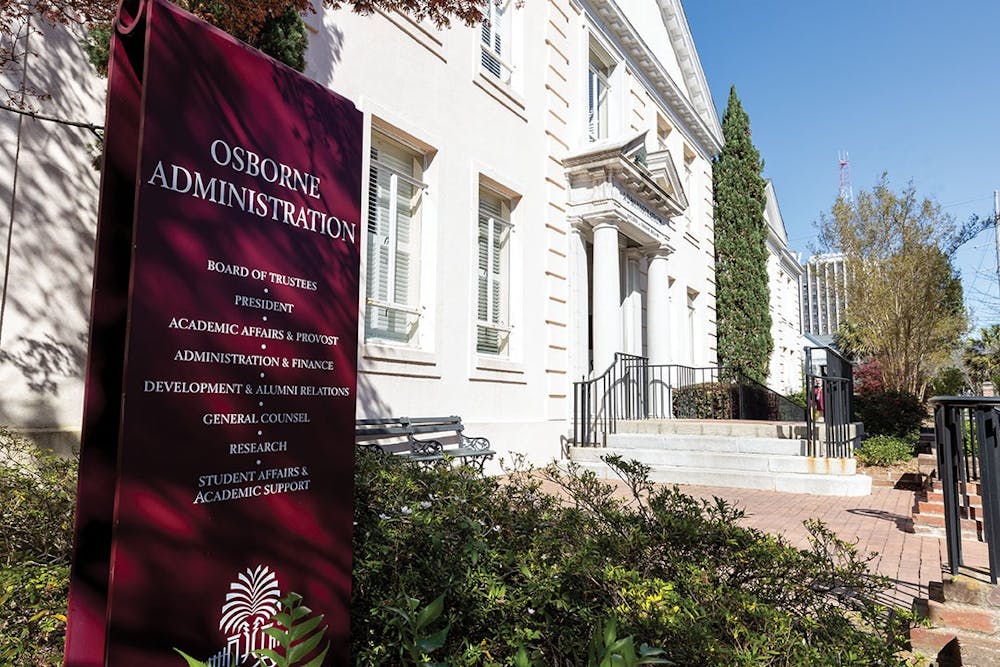Faculty and staff are excited about USC's new president Michael Amiridis, who took the reins this summer. Still, Amiridis must step out of his predecessor's negative light and ensure he listens to his faculty.
Amiridis was elected in January to take over for interim President Harris Pastides, who came back to replace former President Robert Caslen who resigned after plagiarizing a speech at a commencement ceremony and calling USC the University of Southern California.
The board of trustees was tasked with finding the new president. This was met with lots of secrecy when a candidate dropped out last minute, bringing executive sessions and last-minute announcements about candidate forums. Amridis was finally elected, hopefully ending the past couple of years of leadership turnover.
"We're looking forward to working with him," Carol Harrison, a professor in the history department and president of the USC chapter of the American Association of University Professors, said. "We've had several years of temporary, uncertain leadership. So we're looking forward to having a president who we hope will be here for the long run and provide a little stability on campus."
Amiridis is not the only new position filled. Donna Arnett started as the provost on Aug. 1, and Julius Fridriksson was elected as the vice president of research last spring. According to Amiridis, he wants the vice presidents to speak their minds to help him make decisions, and he doesn't always have to be on the right side of the decision.
"The provost is already at work to try to go over some of the positions among deans because it's important to have this team together," Amiridis said. "There are a lot of things that I want to do. But I want to have the discussions with the community here to make sure that we are on the same page."
Those conversations are extremely important, especially for an incoming president who doesn't have some of the insider knowledge faculty, staff or a student might know.
"The key thing I think is for everyone to recognize that shared governance is how universities work best," Harrison said. "That, when administrators consult with faculty and consult with staff — universities are very complicated entities and shared governance is not always the fastest way to make a decision, but it is the best way to make decisions."
Another big issue that Pastides left Amiridis with is the topic of renaming controversial buildings like the Strom Thurmond Wellness and Fitness Center, the Sims and Wade Hampton Women's Quad buildings and the Thomas Cooper Library.
The biggest competitor to these changes is an outdated South Carolina law, the Heritage Act, which prevents colleges from renaming buildings with historical names in the hope of preserving the heritage of South Carolina. In order to change those names, colleges need a two-thirds majority in the South Carolina legislature.
Students at the university have protested and begged the university to change these names since most of them honor people who were pro-slavery and didn't see Black people as true equals. Pastides didn't deliver and lied to the student body about getting this done.
"I understand the passion, and I understand the history behind it," Amiridis said. "Now, at the same time, I understand the legal framework that we have in the state of South Carolina, and we cannot change the names, so this falls into the hands of the legislators."
The president doesn't have any say over the legislature and according to Elizabeth West, a university archivist, it's a long process to get that two-thirds majority and rename the buildings.
"I really am uncertain," West said. "Certainly, the university would have to do a good bit of lobbying with the legislature to take a look at those names and see if they could be removed from the buildings and replaced with others."
The president needs to be an advocate for students through this process as the school year starts up again as this is an important issue to a lot of the student body.
After being hit with the effects of the pandemic and uncertainty of leadership, the university needs someone stable. Having a consistent president will allow everyone at the university to put their trust in the university, and hope that, at least for the students, the significant amount of money they spend every year will be used for everyone's benefit. Hopefully, this person will be Amiridis.
He also needs to listen to faculty and staff regarding concerns about USC, taking even smaller problems into account. One example Harrison said is maintenance issues like the flooding around campus that came with the recent storms.
Amiridis has a lot on his plate, but listening is the best way to start learning.

